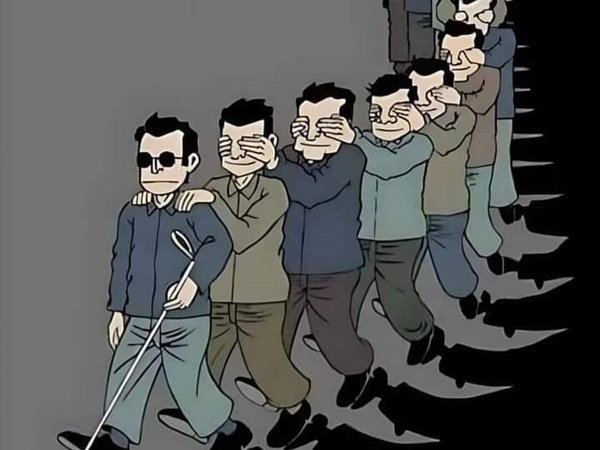<p><br/></p><p><br/></p><p>Nigeria, Africa’s most populous nation, is often described as a country of immense potential—rich in culture, abundant in natural resources, and home to some of the continent’s most brilliant minds. Yet, beneath the surface of this promise lies a festering ailment, one that continues to undermine growth, justice, and genuine transformation: willful ignorance. This dangerous phenomenon has not only clouded public consciousness but has become a persistent feature of everyday life, shaping a society that too often chooses blindness over truth, silence over accountability, and apathy over action.</p><p><br/></p><p>Willful ignorance is not merely a lack of knowledge—it is the deliberate choice to look away, to ignore facts, to avoid questions whose answers may demand uncomfortable change. In Nigeria, this mindset pervades multiple layers of society, from the halls of political power to the crowded streets of everyday citizens. It is the reason why corruption is excused with phrases like “na normal thing,” why failed leaders are celebrated and recycled, and why injustice is often met with a shrug instead of outrage.</p><p><br/></p><p>The consequences of this societal blindness are devastating. In politics, it manifests as a populace that tolerates incompetence and theft because of ethnic loyalty, religious bias, or sheer hopelessness. Leaders exploit these divisions, knowing that many Nigerians will vote not with discernment but with blind allegiance. The result is a cycle of mediocrity—individuals without vision or integrity being handed the reins of leadership while more capable voices are silenced or sidelined.</p><p><br/></p><p>In education, willful ignorance is seen in the glorification of shortcuts over scholarship. Students are often encouraged to "sort" their way through exams, teachers go unpaid, and school infrastructure decays while society cheers entertainers more than educators. The long-term impact is a generation growing up to believe that success comes not from merit or intellect, but from manipulation, connection, or luck.</p><p><br/></p><p>Religiously, the dance with ignorance is perhaps most evident. In a deeply spiritual country like Nigeria, faith is often wielded as a crutch rather than a compass. Many citizens place blind trust in self-proclaimed prophets while ignoring common-sense public health practices, financial planning, or civic responsibility. Dangerous doctrines flourish because questioning them is seen as rebellion, and truth becomes whatever those in spiritual authority declare it to be.</p><p><br/></p><p>Even in health, ignorance is deadly. Superstitions often replace science. Mental illness is interpreted as witchcraft. Preventable diseases claim lives because some prefer traditional myths over medical intervention. The tragedy is not that knowledge isn’t available, but that it is often rejected.</p><p><br/></p><p>This culture of deliberate unawareness is reinforced by the media and entertainment industry, where sensationalism overshadows substance. While documentaries, books, and investigative reports exist, they are overshadowed by gossip blogs and superficial social media trends. Public discourse is often shallow, driven by emotional outbursts rather than informed debate. And in this cacophony, truth is drowned out.</p><p><br/></p><p>Yet, the most dangerous aspect of willful ignorance is that it becomes comfortable. It allows people to escape the responsibility of change. If the system is broken, it's easier to adapt than to fix it. If the police are corrupt, it’s simpler to bribe than to demand justice. If politicians steal, it's more convenient to beg them for favors than to vote them out. Over time, injustice is normalized, failure is internalized, and the abnormal becomes the status quo.</p><p><br/></p><p>But Nigeria cannot afford this blindness any longer. A society that chooses not to see cannot progress. A people who refuse to ask questions cannot grow. The dance with ignorance must end—not through violence or chaos, but through collective awakening. Education must be prioritized not just in schools, but in homes, churches, markets, and social media. Critical thinking must be nurtured. Courage must be celebrated—not just the courage to protest, but the courage to question long-held beliefs and examine uncomfortable truths.</p><p><br/></p><p>This is not to say Nigerians are inherently ignorant—far from it. The Nigerian mind is among the sharpest, the spirit among the most resilient. But until that brilliance is consistently matched with awareness, responsibility, and action, the nation will remain trapped in cycles of disappointment. The blindfold must be removed, not just from the eyes, but from the conscience of the nation.</p><p><br/></p><p>Nigeria’s greatest hope lies in a society that chooses to see—clearly, honestly, and courageously. A society that no longer dances with ignorance, but walks steadily toward truth, justice, and genuine transformation.</p>


Comments